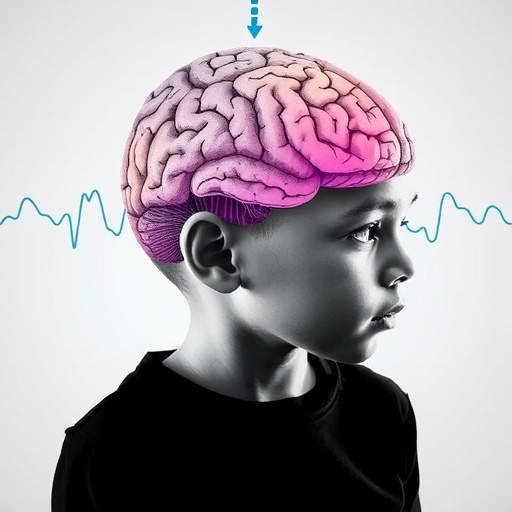In a groundbreaking study published in the Journal of Autism Developmental Disorders, researchers have unveiled significant relationships between altered auditory EEG markers and clinical impairments in individuals affected by Fragile X Syndrome (FXS). Fragile X Syndrome is the most common inherited form of intellectual disability, characterized by a broad spectrum of cognitive, social, and emotional challenges. This research delves into the neurophysiological underpinnings of FXS, focusing particularly on how auditory processing might be intricately linked to the clinical manifestations of the syndrome.
The study’s authors, led by Proteau-Lemieux, utilized advanced EEG technology to record brain activity in response to auditory stimuli, aiming to uncover discrepancies that might correlate with the behavioral and cognitive deficits epitomizing FXS. EEG, or electroencephalography, serves as a pivotal tool in neuroscience, providing insights into the brain’s electrical activity with remarkable temporal precision. The team sought to elucidate whether specific patterns in EEG readings could reliably indicate the severity of clinical impairments often seen in individuals with FXS.
In their interdisciplinary approach, the researchers measured both auditory event-related potentials (ERPs) and steady-state responses while participants underwent various auditory tasks. This approach was particularly vital since FXS often affects an individual’s capacity to process auditory information accurately, a key component of language development and social interaction. Enhanced understanding of these auditory markers may open the door to new therapeutic strategies aimed at improving the quality of life for those who are affected by this syndrome.
The findings were illuminating: the researchers identified distinct alterations in auditory ERPs among participants with FXS compared to control groups, indicating that these neural signals might provide a window into the cognitive processes underlying the disorder. Such deviations in auditory processing can significantly hinder communication skills, which are crucial for social engagement and daily functioning. By recognizing these markers, clinicians may be able to refine diagnostic criteria and develop targeted intervention strategies that cater to individual needs.
Moreover, the potential implications of these findings extend beyond the laboratory. By establishing a clearer link between neurological responses and behavioral manifestations, this research empowers caregivers and educators with quantifiable metrics that could inform teaching methodologies and support systems designed specifically for those with FXS. This is particularly vital in a world increasingly aware of neurodiversity and the varying needs of individuals on the autism spectrum.
In a world where public awareness of autism and related disorders is steadily advancing, this research underscores the importance of continued investigation into the neuroscience of these conditions. Enhanced understanding of the biological roots of auditory processing issues in FXS can foster more informed discussions about genetic predispositions and environmental factors that contribute to the syndrome. This becomes even more critical as society pushes for inclusivity and understanding of diverse cognitive profiles.
Despite the study’s promising implications, the researchers urge caution and underline the necessity for further longitudinal studies. Such investigations would aim to track changes in auditory processing over time and correlate these with the effectiveness of various intervention strategies. Establishing a robust foundation of scientific support for these findings is essential to harnessing their true potential within clinical settings.
Understanding FXS through the lens of auditory processing introduces a novel dimension to both academic inquiry and practical application. While much has been done to investigate the behavioral aspects of FXS, diving deep into its neurophysiological underpinnings allows for a more holistic approach to treatment and support. This research serves as a clarion call for both the scientific community and the public alike, underscoring the myriad complexities of human neurobiology and the interconnectedness of sensory processing and cognitive function.
The primary goal of the study was not just to highlight the neural deficits associated with FXS, but also to provide actionable insights that can lead to improved therapeutic modalities. The researchers expressed hope that their findings would not only inform the academic discourse surrounding FXS but also impact the daily lives of those affected, instilling a greater sense of purpose in their work.
This interdisciplinary research shines a light on the critical nexus between auditory processing capabilities and social-emotional outcomes. If clinicians can leverage these auditory EEG markers effectively, it may pave the way for tailored interventions that are not only more effective but also more personally impactful for individuals facing the challenges of FXS.
The subtle complexities of the human brain continue to perplex and inspire researchers, and studies like these reveal just a fraction of the vast landscape that is human neurobiology. As more investigations are conducted, it is crucial to remain focused on the goal of enhancing the quality of life for individuals affected by Fragile X Syndrome and related disorders. After all, the ultimate aim of such research transcends academic accolades; it is about creating a future where every individual can partake in the richness of human experience.
In summary, the study by Proteau-Lemieux et al. signifies an essential leap forward in understanding the intricate relationships between auditory processing and Fragile X Syndrome. It offers a pathway to developing more precise, impactful interventions that respect the uniqueness of each individual’s experiences and challenges while fostering inclusivity and understanding within broader society. The implications of this research may very well ripple through the future of clinical practices, education, and advocacy, heralding an era of enhanced awareness and empathy for those living with FXS.
Subject of Research: Associations Between Altered Auditory EEG Markers and Clinical Impairments in Fragile X Syndrome
Article Title: Associations Between Altered Auditory EEG Markers and Clinical Impairments in Fragile X Syndrome
Article References:
Proteau-Lemieux, M., Knoth, I.S., Davoudi, S. et al. Associations Between Altered Auditory EEG Markers and Clinical Impairments in Fragile X Syndrome. J Autism Dev Disord (2025). https://doi.org/10.1007/s10803-025-07076-4
Image Credits: AI Generated
DOI: 10.1007/s10803-025-07076-4
Keywords: Fragile X Syndrome, auditory processing, EEG markers, clinical impairments, neurodevelopmental disorders, intervention strategies, neurophysiology.




